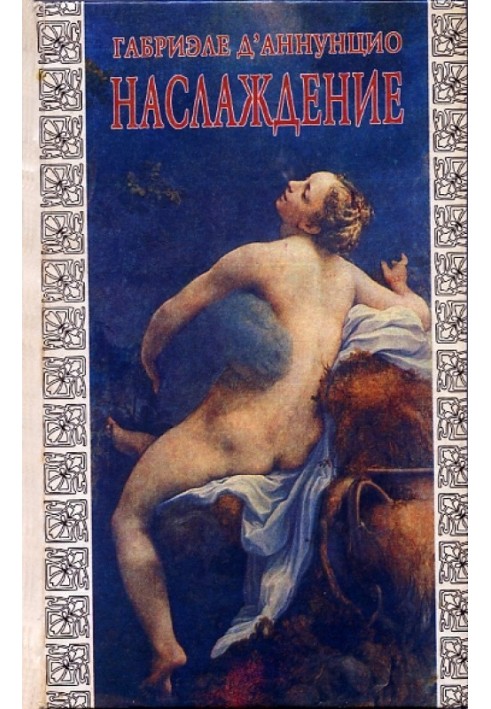Pleasure (“Il piacere”, 1889)
 Instant download
Instant download
after payment (24/7)
 Wide range of formats
Wide range of formats
(for all gadgets)
 Full book
Full book
(including for Apple and Android)
The novel “Pleasure” (1889) belongs to the pen of one of the most brilliant and famous writers in Italy - Gabriele d'Annunzio (1863–1938). At the heart of the novel is the traditional conflict between sincere love and sensual pleasure. With subtle psychologism and exquisite attention to detail, the author reveals the inner drama of a young man, torn between the pursuit of pleasure and that feeling that happens only once in life, and even then not for everyone. “Love is one, but there are thousands of counterfeits to it.” . This aphorism could not be more suitable for defining the essence of this work. The inability to distinguish the main from the secondary, selfishness, and foppishness naturally lead to the spiritual bankruptcy of even such an intelligent, subtle person as the main character of the novel, Andrea Sperelli. This novel is one of masterpieces of world literature of the “modern” era (late 19th – early 20th century) and stands on a par with the works of such authors as Oscar Wilde, Anatole France, Joris-Karl Huysmans. For some reason, the literature of this period is called “decadence” (“decadence,” decay), although, by all indications, it was a heyday. Writers of that time were characterized by a desire for sophistication, subtlety of presentation, attention to detail, unusual experiences, rare beautiful things and their description. All this fully applies to the work of Gabriele d'Annunzio, who went through a difficult path from the wretched descriptiveness of the so-called. “realistic school” or “verism” to the liberation and graceful entertaining nature of the narrative. The work of Gabriele d'Annunzio is very little known in the vast expanses of the former USSR. How so? One one of the most famous (even scandalous) writers. His books are devoured not only in Italy, his plays do not leave the stages of the world's best theaters, his poems are considered an example of Italian lyricism. And suddenly - unknown. “And the casket just opened!” The fact is that V.I. Lenin (who until recently was considered an example of taste and the main literary critic of all times) in the article “Party organization and party literature” (1905) spoke very unflatteringly about the work of D’Annunzio. In addition to this, Gabriele d'Annunzio was a passionate patriot of Italy, which forced him to fight in the 1st World War, and later to cooperate with the fascist regime. During this regime, he even received the title "prince" and became president of the Royal Academy of Fine Arts. That's it. After this could put an end to the acquaintance of the domestic reader with the work of Gabriele d’Annunzio. It has practically not been translated or published since pre-revolutionary times. An exception is the collection “Italian Novella” (1960). Even this edition of the novel “Pleasure”, undertaken by the publishing house “Lestvitsa” in 1993, is just a reprint from the pre-revolutionary edition edited by J. Baltrushaitis (1908). When mentioning D’Annunzio, stupid accusations of “immoralism” have traditionally been and are being made, “ hedonism,” “aestheticism,” and other “-isms” that hysterical domestic criticism has been so generous with since the time of Belinsky. Oh, in vain! Read the novel and see for yourself. And one more thing. The book is intended for an educated reader. It is all imbued with the centuries-old spirit of Italian (and not only) culture. Therefore, only a person whose names Polayolo, Bernardino Pinturicchio, Annibale Caracci, Clodion, Hubert Gravelot, Rameau, Madame de Paraber and others do not evoke a passionate desire to look into an encyclopedic dictionary can enjoy it. In addition, in the pre-revolutionary edition and in the reprint there are no notes, and translations of foreign phrases are given only for Greek, Spanish and English, but not for French and Latin due to their common knowledge at that time. So, this novel is a pleasant antidote, an antidote, panarion from all kinds of “realism”, “proletarian literature”, “horror”, “chernukha”, “nationality”, “erotica”, “thrillers” and other images of many-sided vulgarity. Poluyanov P. F. (Amfortas)
Data sheet
- Name of the Author
- Габриэле д'Аннунцио
- Language
- Ukrainian
- Release date
- 1993
- Translator
- Е. Р


























